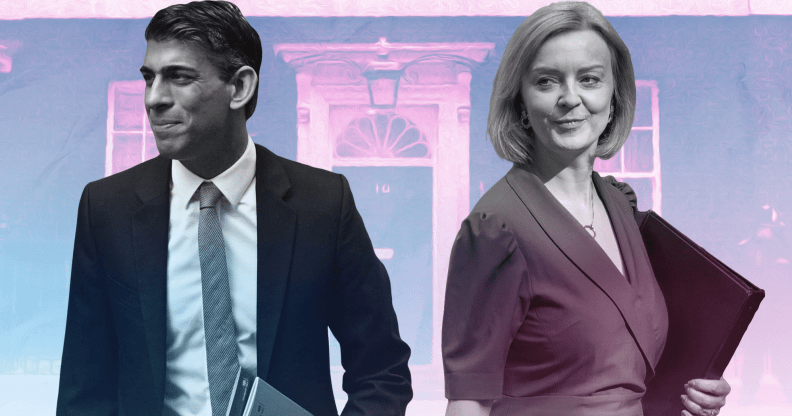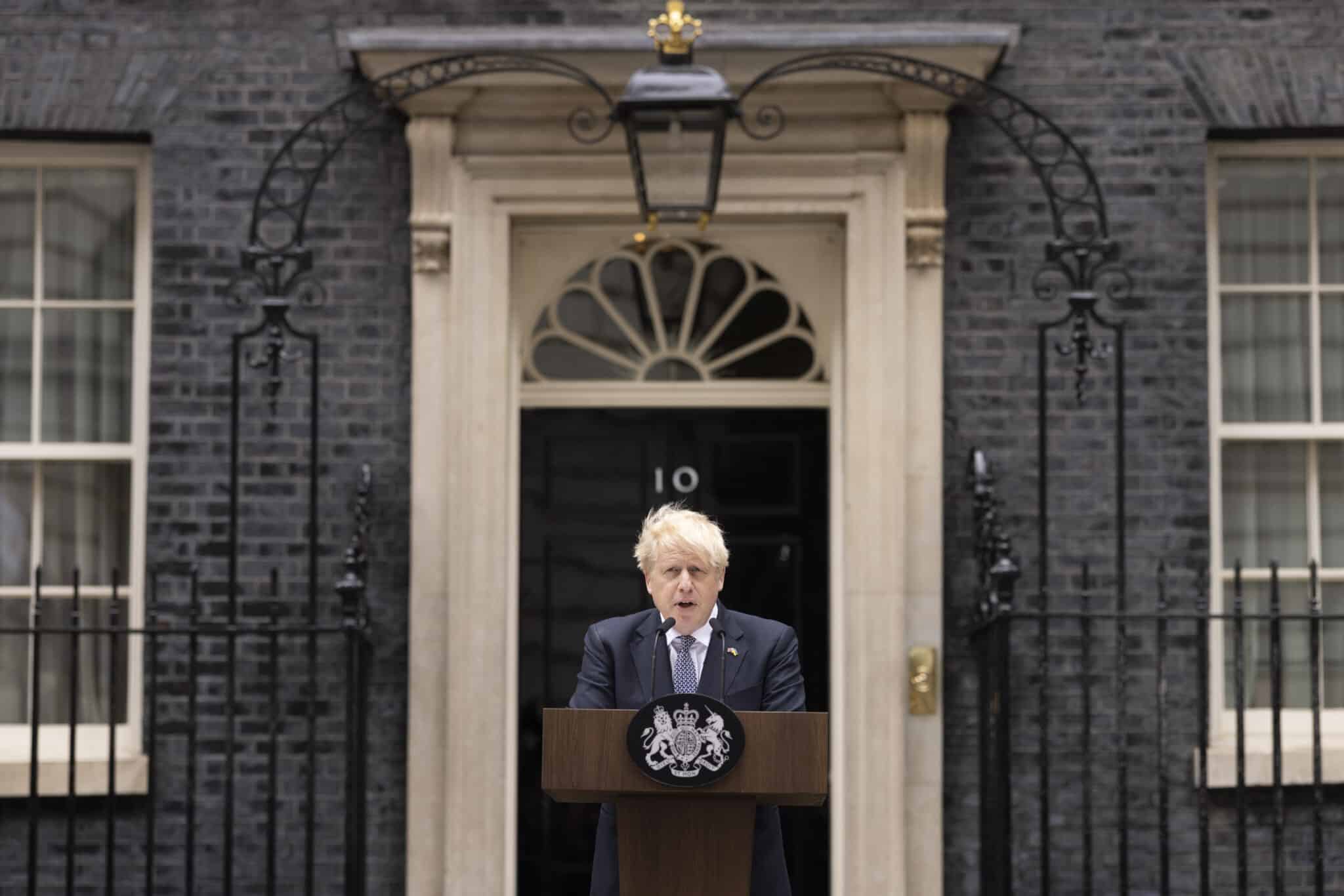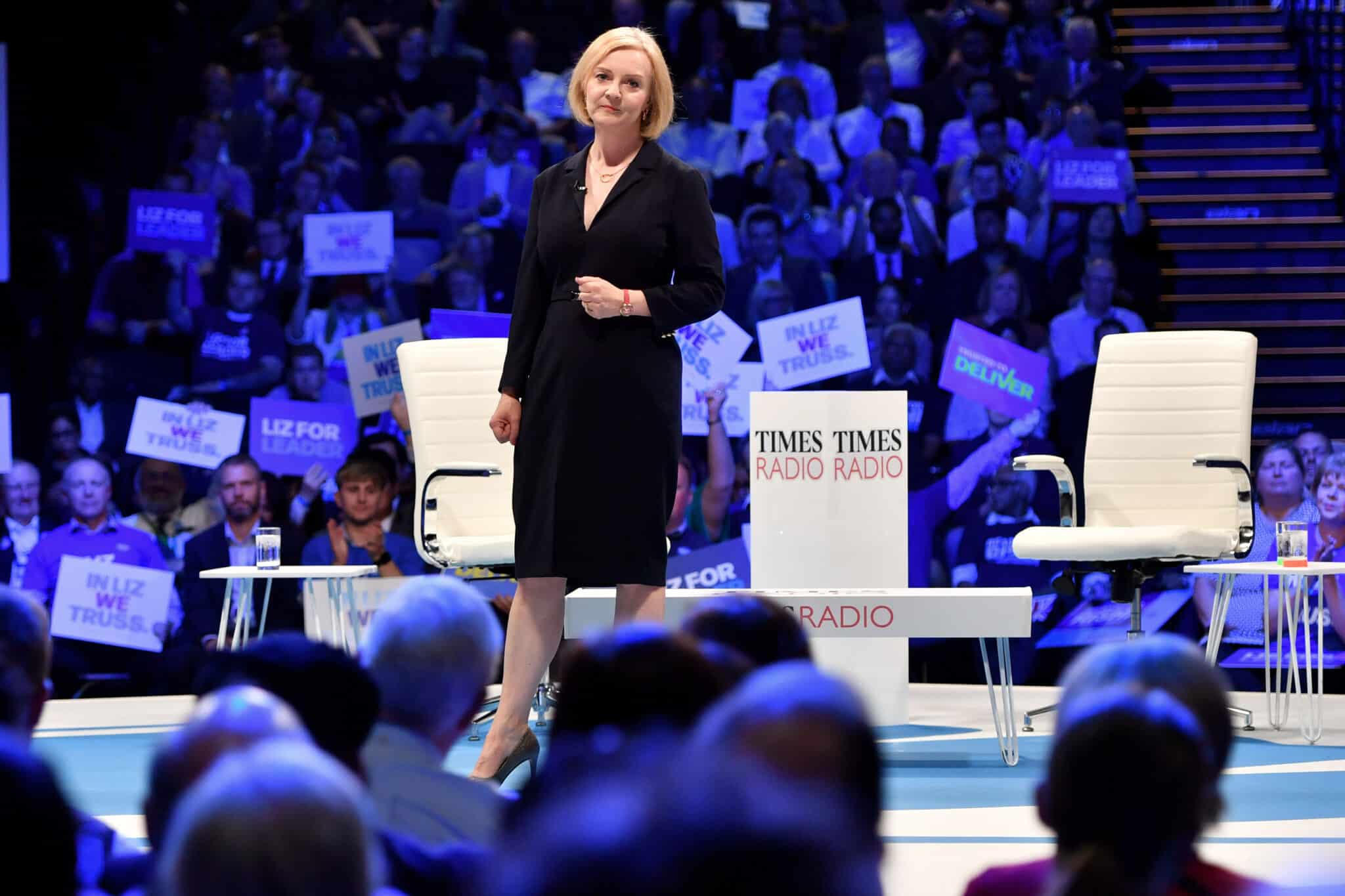How shameless attacks on trans people defined a car-crash Tory leadership race

Liz Truss and Rishi Sunak.(Getty/PinkNews)
Throughout the divisive Conservative leadership race, one subject has reigned supreme – trans exclusion.
Since Boris Johnson’s reluctant and arguably overdue decision to step down as Conservative Party leader on 7 July – with his official resignation as prime minister to come on 5 September – an atmosphere of incredulous anticipation has surrounded the race for his successor.
Immediately, there was an attempt to use the race as a fresh lick of paint on the chipped-away values of the Conservatives. Promises of “a clean start” felt almost satirical amid hot topics such as the cost of living, climate action and recuperating the losses of a post-Brexit economy.
And while contenders were keen to paint themselves as the only one who could rescue the party, one thing that has remained almost unanimously consistent between each Tory candidate is tired anti-trans sentiments.
“The Tory leadership race has become a contest of who can attack trans people most,” Labour MP Nadia Whittome reflected to PinkNews.
Before Johnson had even announced that he would step down, attorney general Suella Braverman announced her intent to run for the party leadership with an anti-trans dogwhistle.
“We need to get rid of all of this woke rubbish and get back to a country where describing a man and a woman in terms of biology does not mean that you’re going to lose your job,” Braverman told ITV’s Robert Peston, hours before Johnson threw in the towel.
As the race began in earnest, Penny Mordaunt emerged as a clear frontrunner. Having previously been considered an LGBTQ+ ally, she almost immediately burned her bridges with the community when she posted a Twitter thread clarifying she believed trans women were not “biological women”. She doubled down on this stance repeatedly until she was ultimately knocked out of the contest.
I hope in, in the next few days we’ll able to discuss how we get our economy growing again and enable our citizens to live well. Right now, I’d like to address another question that I’ve been asked: pic.twitter.com/OImF6kUVzx
— Penny Mordaunt (@PennyMordaunt) July 9, 2022
What is most remarkable about Mordaunt’s shamefully-sudden shift isn’t so much that it happened, but that it represents a grim future for the prospects of the transgender community.
It showed that Conservative politicians see a “war on woke” as little more than an easy vote winner.
As Labour MP Kate Osborne told PinkNews: “The fact that the Tories are undermining trans rights is not surprising – if they had a party motto it would probably be ‘never let basic humanity get in the way of a good vote winner’.”
“This Tory government have consistently politicised the debate around trans rights in the UK, and the two Conservative leadership candidates [Rishi Sunak and Liz Truss] have taken that to a new extreme with their appalling use of trans and non-binary people as a political football to score points with.”

Boris Johnson addresses the nation as he announces his resignation outside 10 Downing Street. (Dan Kitwood/Getty)
Reducing trans right to a political football, Nadia Whittome said, “endangers people and does nothing to tackle the issues that matter to my constituents – whether trans or cis”.
She added: “Instead of fanning the flames of hatred, the candidates to be the next prime minister should be setting out concrete policies to improve people’s lives.
“For trans people, they should be addressing how they will tackle waiting lists for healthcare, combat transphobic violence and abuse, and dismantle barriers to housing and employment.”
Of course, attacks on trans people aren’t being perpetuated by the entire party or even the initial leadership candidate lineup. Transport secretary and also-ran Grant Shapps proved anti-trans sentiments don’t have to be the standard for leaders after being asked by Sophy Ridge on Sky News whether trans people were valid in their gender identity.
“If there’s a Shapps administration where I’m prime minister, I will not be spending most of my time on these kinds of issues,” Shapps said. “I think we owe everybody love and respect. People should be able to get on and live their lives. There’s clearly a biological basis on your birth but if people want to … transition gender, that is their choice and they will always have my support.
“I think the country is far more interested in things like the cost of living, the bread and butter issues, jobs and the rest of it.”
However the rest of the field didn’t seem to agree with him. Other runners-up include Kemi Badenoch, whose campaign launch saw “men” and “ladies” signs added to gender-neutral toilets, and current chancellor Nadhim Zahawi, who vowed to “protect” children “from damaging and inappropriate nonsense being forced on them by radical activists”, sparking fears of a new Section 28.
But most troubling of all was the rhetoric that came from the final stretch of the contest – the two-way race between Rishi Sunak and Liz Truss, which has been littered with anti-trans claims and dozens of exclusionary promises in sports, public facilities, and more.

Foreign secretary and Conservative leadership hopeful Liz Truss speaks on stage on 23 August, 2022. (Anthony Devlin/Getty)
Truss, currently the minister for women and equalities as well as foreign secretary, has vowed to “protect single-sex spaces”, presumably from trans people; made clear that she didn’t support under-18s making “irreversible decisions about their own bodies”, despite current hormone blockers for under-18s being “physically reversible”; and stating that she doesn’t believe trans women are women.
As Truss surged ahead in the polls. Sunak decided his saving grace would be taking “this lefty woke culture that seems to want to cancel our history, our values, and our women”.
“We are determined to end the brainwashing, the vandalism and the finger-pointing,” Sunak said during a hustings event. “Too often, existing legislation is used to engage in social engineering to which no one has given consent.” He has also denied that trans women are women.
The blatant disregard for an entire community of people by both candidates was particularly disgusting to Labour MP Ben Bradshaw, who told PinkNews: “It is depressing and worrying how the bipartisan approach to LGBTQ+ equality Britain has enjoyed in recent years has been lost, as the two contenders for the Tory leadership try to outdo themselves in their levels of transphobia.”
It’s not just Labour MPs who are shocked. Three former Tory ministers have told PinkNews they are “appalled” by some of the anti-trans talking points put forward by Sunak and Truss.
One former minister described the leadership race as “shameful”, saying Truss and Sunak were “pandering to bigots” and tarnishing the progress made on LGBTQ+ issues under prime ministers David Cameron and Theresa May.
After all, marriage equality was introduced under a Tory government (though support from the Lib Dem coalition was crucial, and the law itself was architected by the Lib Dems’ Lynne Featherstone), while in more recent years the party has overseen pardons for men convicted of historic gay sex offences and the introduction of mandatory LGBTQ-inclusive relationships and sex education.
SNP MP Angela Crawley told PinkNews: “I don’t believe either candidate fully understands what it means to be a trans person and the stigma associated. Both candidates should expand their horizons, meet with trans people and listen to them if we are to create a society where trans people are treated equally and are not stigmatised.”
Truss and Sunak’s rhetoric hasn’t arisen from nowhere. Boris Johnson had increasingly taken aim at trans rights in the dying days of his tenure, with veteran human rights campaigner Peter Tatchell previously telling PinkNews that his history of anti-LGBTQ+ remarks and “bad taste jokes” had “stoked the culture wars”.
“It is reprehensible the way he disparaged trans people and supported discrimination against them in sport and the provision of women’s services,” Tatchell continued. “He flip-flopped on banning conversion practices and was intent on excluding trans people from any ban.”
Ben Bradley suggested: “The Conservative Party increasingly resembles the US Republicans under Trump in their willingness to stoke the so-called ‘culture wars’, despite the damage that does to so many people, because they believe, wrongly in my view, it will help them electorally.”
Regardless of who becomes the UK’s next prime minister, it seems certain that trans exclusion will continue to be used as a vote-winning exercise – something that’s likely to only get worse as the UK heads into another general election, some time in the next two-and-a-quarter years.
And the more trans exclusion is politicised, the more fingers are pointed directly at the trans and non-binary community.

